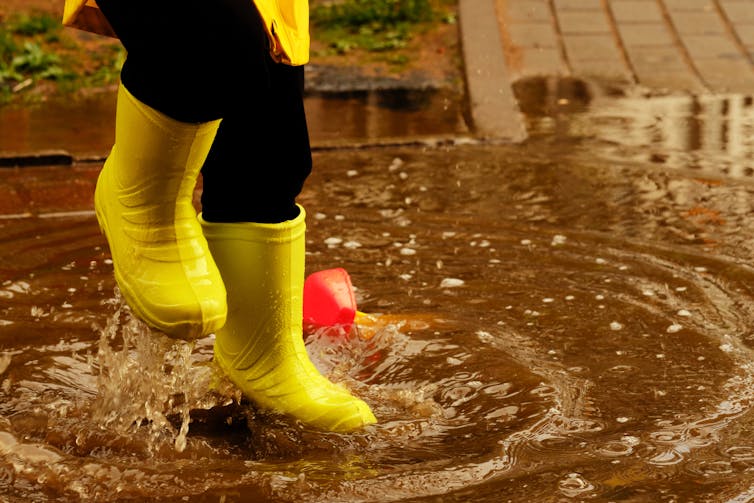Children learn through play – it shouldn’t stop at preschool
- Written by Kate Noble, Education Policy Fellow, Mitchell Institute, Victoria University
The transition from preschool to school is a big deal for many children and parents. Over the next few weeks, many preschoolers will take part in a transition program, designed by their teachers, to prepare them for school.
They’ll meet their foundation teachers, spend some time in a classroom and hopefully make some new friends.
These children’s education has so far focused on play-based learning. This means they’ve learnt through exploring and playing, supported by skilled early childhood educators.
But they’re about to enter a world of formal learning. Although play-based learning does happen in schools, there tends to be a stronger focus on instruction.
The current system isn’t working for many students. One-quarter of children who start school aren’t developmentally ready for this transition and levels of mental ill-health among children are concerning.
Read more: More children are starting school depressed and anxious – without help, it will only get worse
Many educators and researchers argue more play in the early years of school could better support children’s transition and learning. Parents think so too. In a recent survey, 93% of parents acknowledge the benefits of play and 72% said the first years of school should focus more on play-based learning.
If we’re genuinely committed to improving outcomes for all children – and we know play benefits learning – we need to better integrate play-based learning into schools’ formal learning structures.
How do we learn through play?
Increasing play-based learning in schools means changing how we think about playing. When many of us think about play, we probably think of free play, which is unstructured and directed by children, usually without adult involvement.
Play-based learning, though, is more usefully conceived as a spectrum, with free play at one end and teacher-guided, playful learning at the other. In between are a variety of methods either entirely based on play, or incorporating elements of it.
For example, a skilled educator can help children discover new ideas when they play with water. The educator might encourage children to playfully experiment with water tubs and toys in a way that allows them to develop their own hypotheses about how water behaves in certain situations and why.
The educator could work with the children to test their hypotheses, questioning and talking to them about what they observe during their play.
 Playing with water can be a learning experience.
from shutterstock.com
Playing with water can be a learning experience.
from shutterstock.com
Play-based learning in the early years of school can significantly improve kids’ language and social connections. Research shows the impact of play-based learning extends into other areas of development too.
High-quality play-based learning can:
Quality depends on warm and responsive relationships with skilled educators and an environment that facilitates exploration and learning. It also involves a developmentally appropriate learning program.
The skills children learn through play equip them to engage with formal, academic learning. When children start to develop and harness these skills, research shows they’re better able to cope with the demands of formal learning and thrive later on in school.
And when more than 70% of children don’t get the recommended amount of physical activity, play is even more essential.
Read more: Let them play! Kids need freedom from play restrictions to develop
Many researchers and educators believe less play – inside and outside the classroom – may be contributing to rising levels of anxiety, depression, and challenges related to attention and self-control. For children experiencing high levels of stress or other forms of disadvantage, play can be a vital antidote.
The links between disadvantage, poor health, changing lifestyles, and inequality are, of course, complex. But there is good evidence to suggest how we approach education in the early years – particularly in relation to play – is an important part of how we address these challenges.
Australia’s school system downplays play
The Australian Early Years Learning Framework guides educational programs for children aged 0-5. It complements the Australian Curriculum, which guides learning throughout primary and secondary school.
While complementary, the frameworks take quite different approaches to play. Play is a fundamental component of the Early Years Learning Framework. In contrast, the curriculum’s focus on academic performance has extended formal learning to the early years of school and even preschool, despite the fact play-based learning is far more appropriate at these ages.
There are a few policy options that can support more play-based learning in the early years and ensure it is integrated into education in the middle years of childhood and beyond. These options include:
Read more: Which families delay sending their child to school, and why? We crunched the numbers
Increasing school starting ages by law would involve governments and parents meeting the significant cost of an extra year of early education and care. Research shows most parents want less break time at school, and schools are already finding it difficult to adequately cover the curriculum in the time they have.
While some policy options are likely to gain more traction than others, there is strong support for increasing play-based learning in schools. This will require teachers, governments and families to all be on the same page about the benefits of play for children’s learning.
Authors: Kate Noble, Education Policy Fellow, Mitchell Institute, Victoria University
Read more http://theconversation.com/children-learn-through-play-it-shouldnt-stop-at-preschool-126921



















